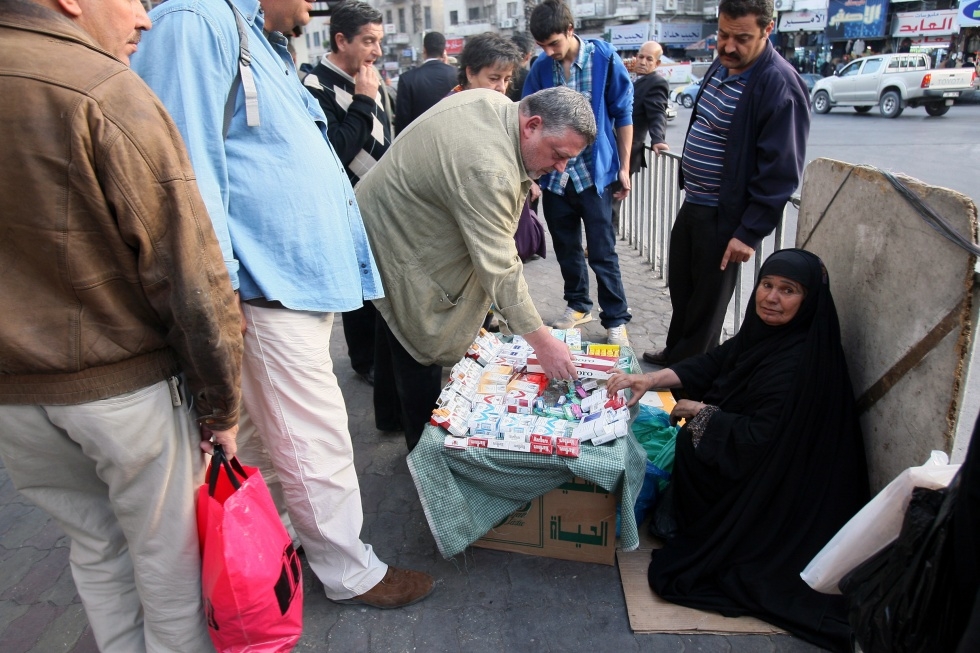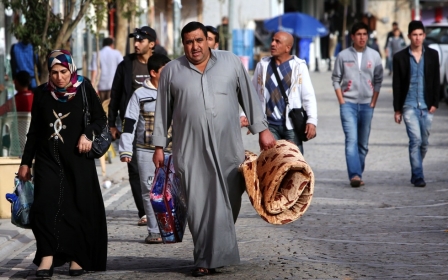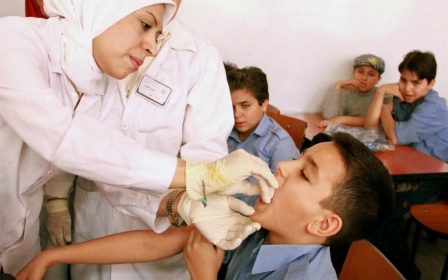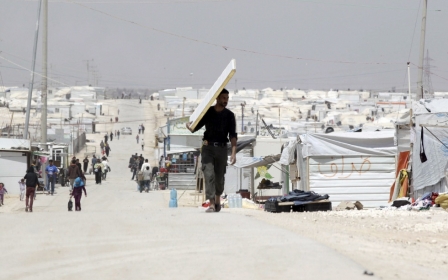Little hope of return for new wave of Iraqi refugees in Jordan

So frenzied was Hyam Hussnie’s late night escape on a desert highway that she could not believe that when she arrived in Jordan “my children were still alive and with me.”
She fled the Iraqi capital Baghdad with her husband and children six months ago with only their ID cards.
“Our daily lives [had] turned into a horror film: rape, murder, kidnap, suicide attacks,” her husband Alaa Zaidaan told IRIN from the Jordanian capital, Amman, where the family now lives.
As of 15 May, 3,100 Iraqis had sought asylum with the UN Refugee Agency (UNHCR) in Jordan since the beginning of the year - or around 170 new Iraqi refugees every week.
Along with a backlog of cases from 2013, UNHCR registered 5,097 Iraqis over the same period.
New MEE newsletter: Jerusalem Dispatch
Sign up to get the latest insights and analysis on Israel-Palestine, alongside Turkey Unpacked and other MEE newsletters
This represents a significant increase compared to recent years: UNHCR registered 4,060 new Iraqi arrivals during the entire year of 2012, and 5,110 in 2013.
Unlike some of their predecessors, the new wave of arrivals is coming with less hope of returning home.
“They’re coming with most of their belongings, and they’re coming to stay,” as one aid worker put it.
Rising death toll
Iraqi militants have been emboldened since the US troop withdrawal in 2011, and as extremism has flourished in the Syrian conflict next door.
A separate insurgency in Anbar Province, after a harsh crackdown by the Shia-led government on protesters demanding more rights for Sunnis, also contributed to the increase in violence.
2013 was the deadliest year in the country since the civil strife of 2006-8, and figures have remained just as high in 2014, with 2,276 civilian deaths and another 4,646 injuries in the first four months of the year, according to the UN Assistance Mission in Iraq (UNAMI).
These figures exclude casualties in the province of Anbar, where a localized conflict between the government and Islamist militia groups has been raging since January.
An additional 471 civilians were killed in Anbar from January to April, in addition to 2,587 injuries, according to the Anbar Medical Directorate.
The fighting has left nearly 73,000 families internally displaced.
Iraq Body Count, an independent UK-based tracking database, cites a nationwide civilian death toll of 4,558 so far this year.
The higher level of violence has marked this new wave of refugees with one point of distinction:
In 2012 and early 2013, according to UNHCR, heads of households sent their families to Jordan so that their children could continue their education without disruption, for example, and would then go back to Iraq, where it was easier to make a living.
Now, heads of households are joining their families in Jordan.
“We used to see some family members come to Jordan and leave others back home,” said Eman Ismaeel, programme manager at CARE International, which works with Iraqi refugees in Jordan. “But in recent months, whole families come together and they have no hopes of return.”
Reasons for fleeing
While the violence in Anbar has led to massive internal displacement, UNHCR says about 10 percent of the new arrivals in Jordan come from Anbar, whereas the majority come from Baghdad.
One theory is that the insecurity makes access to the Jordanian border from Anbar very difficult. Another is that access to visas for Jordan - issued either by the Jordanian embassy in Baghdad or by travel agencies at the governorate level - may be harder to secure in Anbar.
“They cite violence, insecurity, threats of murder as their motive to leave,” said Salam Kanaan, CARE’s country director.
UNHCR says the majority of refugees flee targeted persecution or the fear of it.
“They haven’t necessarily experienced anything personally, but the surrounding circumstances are indicative that it is a matter of time before something happens,” one senior protection officer said.
For Zaidaan, a shopkeeper, it was constant attacks by “unknown militias” that led him to take the decision to flee.
In one incident, he was severely beaten, he says, and lost some of his teeth.
He believes he and his family became targets of Islamist groups because they are Sabeans, a minority sect in Iraq and Iran belonging to the gnostic religion Mandaeism.
“They always called us infidels and said that we could not work here. They said we would go to hell,” he said.
“It is not safe for anyone over there nowadays.”
“Nothing frightens my children more than the idea of going back to Iraq,” added another refugee who gave the nickname Abu al-Hassan.
He fled Baghdad for Jordan four months ago after being targeted because he was Sunni.
“It has become like a nightmare after all the bloodshed we have seen.”
UNHCR says professionals also continue to be specifically targeted.
Impoverished lives
But despite the intention to stay in Jordan longer-term, some of the Iraqi families who fled to Jordan in recent months came with very little or no money.
“They all come in dire financial conditions, with no savings or assets to use,” Kanaan said.
UNHCR says the majority of Iraqi refugees continue to be middle class - one indication is that they still arrive largely by plane.
However, a dramatic rise in prices in Jordan and increased competition for jobs due to the presence of at least 600,000 Syrian refugees has made it harder for Iraqis to make a living.
In addition, UNHCR says working in the informal sector has become increasingly dangerous as the government shows less tolerance for breaches of labour laws, resulting in some arrests and detentions.
Zaidaan’s one-bedroom flat, which was once used as a storage room in the basement of an old building, costs him 100 Jordanian dinars (US$144) per month.
The landlord furnished it with four mattresses. Three small teddy bears, donated by the local church, hang over decaying walls with crumbling paint.
“We use this to decorate the house as we could not afford to paint it,” says Hussnie.
The kitchen - too small to fit more than one person - leads to the bathroom. Both rooms do not see any daylight or fresh air, leaving their 11-year-old boy, who has been diagnosed with a lung infection, feeling ill.
It is very difficult for Iraqi refugees to work legally in Jordan, and with aid money shrinking and donors focused on Syria, aid agencies are doing less and less every year to support them.
“It is no big secret that they [Iraqis] have been forgotten,” said Abeer Ziadeh, programme’s director at Save the Children.
Because UNHCR’s funding for non-Syrian refugees has been on the decline for the last few years, its assistance is targeted to only the most vulnerable Iraqi families: it can only afford to give monthly cash payments to about 2,500 families.
Despite having received some emergency assistance from CARE, Zaidaan’s family has not been able to pay rent for the past three months.
“Shall we sit outside and beg to bring money?” he asks.
Yearning for stability
The lack of money has also kept Zaidaan’s children and those of many other Iraqi families in Jordan out of school.
Although Iraqis living in Jordan have free access to education at public schools, many families do not send their children to schools because they cannot afford basic items like shoes, lunches and clothes, said Sate’ Qudah, programme manager at Save the Children.
“[It was] too dangerous to send them to school in Iraq, and here [in Jordan] we could not afford it,” Zaidaan says.
It is just one of many abnormalities in a life unhinged.
The bulk of Iraqi refugees in Jordan - more than 26,000 are actively registered with UNHCR, though the government said last year that in 2012 there were 64,000 Iraqis in Jordan in total - came earlier last decade, during the worst years of violence in Iraq, and have since spent years in Jordan.
But even they are still searching for durable solutions - either return to Iraq, integration in Jordan or resettlement abroad.
This does not bode well for newer arrivals looking for stability.
“Peace is a blessing, but we hope to lead normal lives like any human being one day,” Zaidaan said.
Middle East Eye delivers independent and unrivalled coverage and analysis of the Middle East, North Africa and beyond. To learn more about republishing this content and the associated fees, please fill out this form. More about MEE can be found here.




